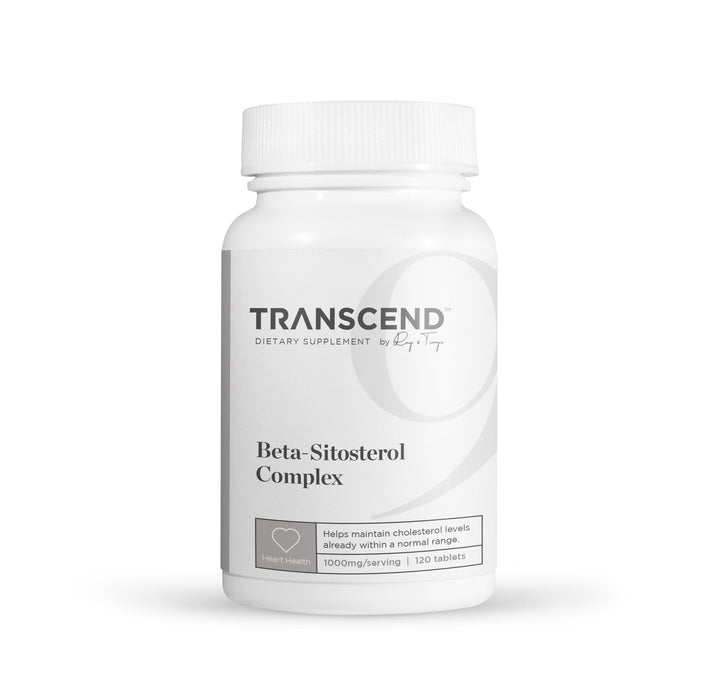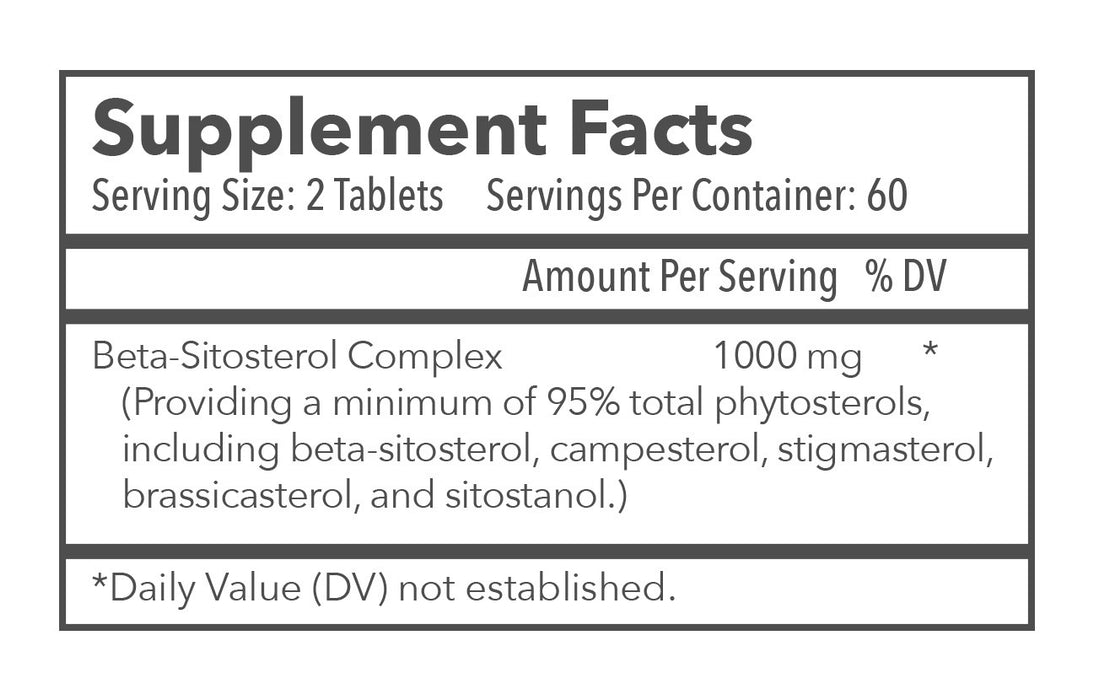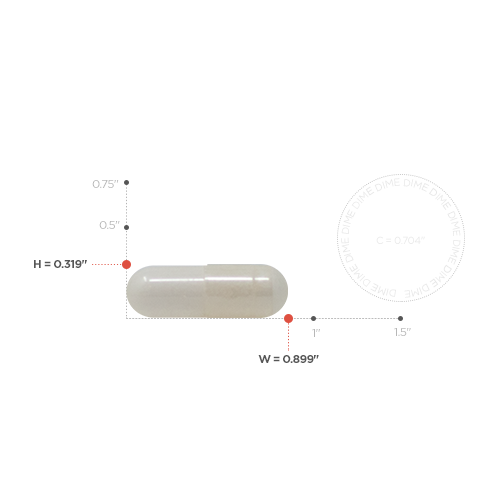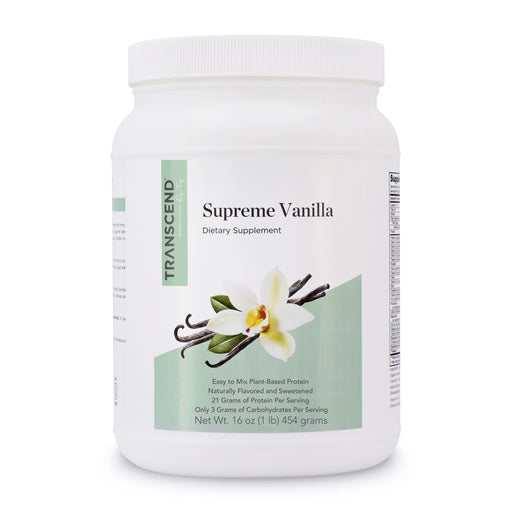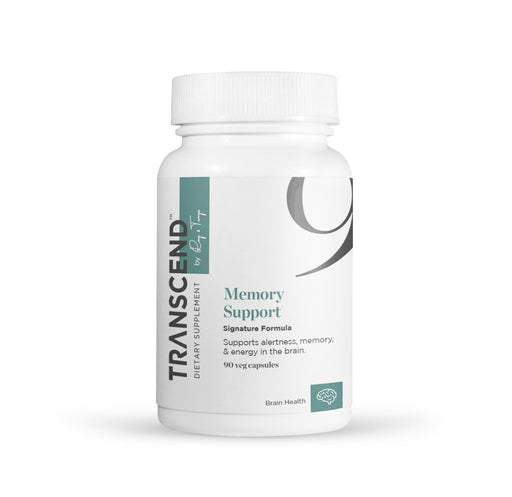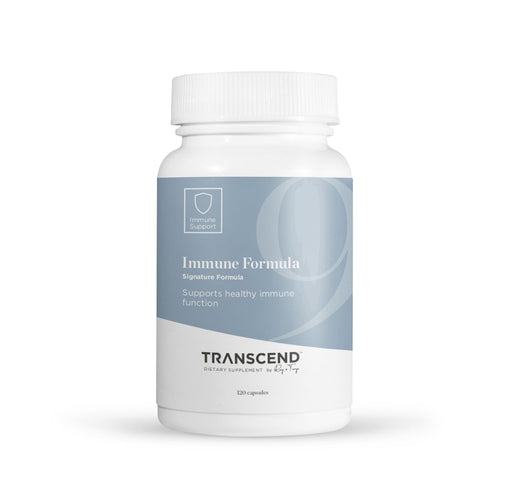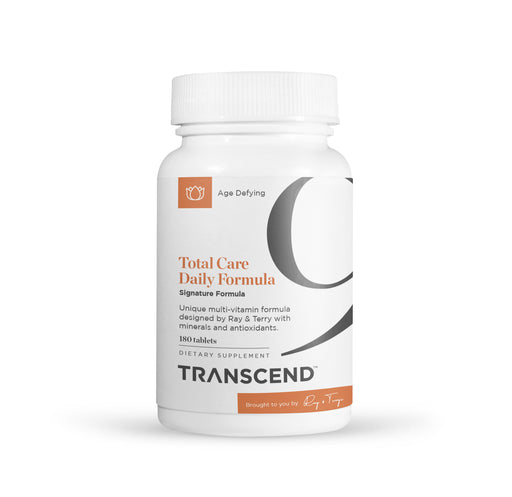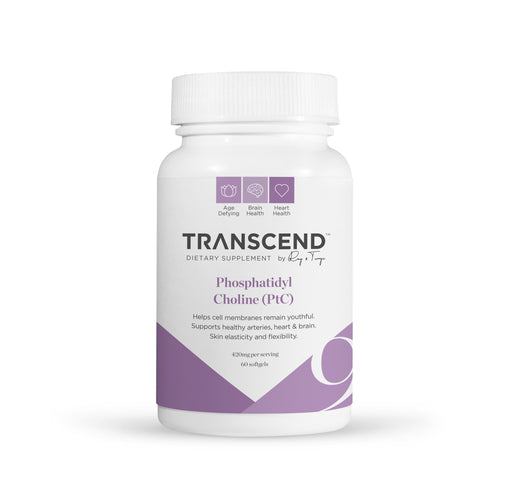Beta Sitosterol, 120 count
Beta-Sitosterol Complex 1000 mg *
(Plant phytosterols, including beta-sitosterol, campesterol, stigmasterol, brassicasterol, and sitostanol.)
Maintain healthy cholesterol
- Lowers blood levels of cholesterol*
- May help reduce the risk of heart disease*
- Supports prostate health
- Helps maintain healthy blood sugar levels
- Promotes immune system function
- Exhibits anti-inflammatory properties
Phytosterols are plant compounds that resemble animal cholesterol and perform similar functions in plant life.1 These substances can only enter the body through dietary sources, unlike cholesterol which is produced within the body itself.
Plant sterols, including beta sitosterol, are an effective natural supplement for maintaining healthy cholesterol.2,3 By inhibiting the absorption of cholesterol from the intestinal tract, plant sterols actually help block cholesterol from being absorbed into the bloodstream. Sterols have been shown to reduce total and LDL cholesterol by up to 15 percent.4
The federal Food and Drug Administration (FDA) concluded that plant sterol esters, including beta sitosterol, may reduce the risk of CHD by lowering blood cholesterol levels. There is significant evidence to indicate that beta-sitosterol lowers cholesterol levels, although there is no proof that long-term use lowers the risk of CHD.
According to FDA documents, scientific evidence establishes that including plant sterol/stanol esters in the diet helps to lower blood total and LDL cholesterol levels.
These compounds have been used in cholesterol-reducing margarines, but many of these products contain unhealthy fats as well, so Ray & Terry recommend taking plant sterols as a supplement in pill form instead.
In the lab, phytosterols have been shown to reduce lipid levels as well as help support healthy glucose levels. One small study found a reduction in insulin resistance when phytosterols were included in the diet.5,10
Research on plant sterol esters indicates that these natural compounds can reduce inflammation in the prostate and intestines.8 Experiments on colitis, for example, have shown that consuming a high-fat diet contributes to intestinal inflammation. Adding plant sterols to the diet reduced intestinal inflammation in laboratory animals.9,12
The mechanism for plant sterols’ effect on inflammation appears to relate to T-cell function. Due to their ability to help reduce T-cell-based immune activity, plant sterols have been indicated to support healthy immune system function. 6,7,11
Other Ingredients: Dicalcium phosphate, microcrystalline cellulose, vegetable stearic acid, vegetable magnesium stearate, silicon dioxide, croscarmellose sodium, and aqueous film coating (purified water, hydroxypropyl methylcellulose, and vegetable glycerin).
ALLERGEN WARNING:
CONTAINS SOY (PLANT STEROLS).CAUTION:
Do not exceed the recommended dose. Pregnant or nursing mothers, children under the age of 18, and individuals with a known medical condition should consult a physician before using this or any dietary supplement.Suggested Use:
Take 2 capsules twice daily on an empty stomach, or as directed by a healthcare professional.Ray & Terry’s Beta Sitosterol contains 120 tablets per bottle. Each tablet contains 500mg plant sterol complex, which yields 200mg (minimum) beta sitosterol per capsule.
* The federal Food and Drug Administration (FDA) concluded that plant sterol esters, including beta sitosterol, may reduce the risk of CHD by lowering blood cholesterol levels. There is significant evidence to indicate that beta-sitosterol lowers cholesterol levels, although there is no proof that long-term use lowers the risk of CHD.
According to FDA documents, scientific evidence establishes that including plant sterol/stanol esters in the diet helps to lower blood total and LDL cholesterol levels. https://www.accessdata.fda.gov/scripts/cdrh/cfdocs/cfcfr/CFRSearch.cfm?fr=101.83
References:
- Awad AB, Fink CS. Phytosterols as anticancer dietary components: Evidence and mechanism of action. J Nutr. 2000;130(9):2127-30.
- Cater NB, Grundy SM. Lowering serum cholesterol with plant sterols and stanols: Historical perspectives. J Postgrad Med. 1998;6-14.
- Katan MB, Grundy SM, Jones P, Law M, Miettinen T, Paoletti R; Stresa Workshop Participants. Efficacy and safety of plant stanols and sterols in the management of blood cholesterol levels. Mayo Clin Proc. 2003;78(8):965-78.
- St. Onge et al. Consumption of a Functional Oil Rich in Phytosterols and Medium-Chain Triglyceride Oil Improves Plasma Lipid Profiles in Men. J. Nutr. June 2003; 133:1815-1820.
- Ivorra MD, D'Ocon MP, Paya M, Villar A. Antihyperglycemic and insulin-releasing effects of [Beta]-sitosterol 3-[Beta]-D-Glucoside and its aglycone, [Beta]-sitosterol. Arch Int Pharmacodyn Ther 1988;296:224-231.
- Bouic, PJD. Sterols/Sterolins: The natural, nontoxic immuno-modulators and their role in the control of rheumatoid arthritis. The Arthritis Trust 1998;Summer:3-6.
- Bouic PJD, Etsebeth S, Liebenberg RW, et al. Beta-sitosterol and beta-sitosterol glycoside stimulate human peripheral blood lymphocyte proliferation: implications for their use as an immunomodulatory vitamin combination, Int J Immunopharmacol 1996:18:693-700.
- Gupta MB, Nath R, Srivastava N, et al. Anti-inflammatory and antipyretic activities of [Beta]-sitosterol. Planta Medica 1980;39:157-163.
- te Velde AA, Brüll F, Heinsbroek SE, Meijer SL, Lütjohann D, Vreugdenhil A, Plat J. Nutrients. 2015 Oct 15;7(10):8518-31. doi: 10.3390/nu7105412.
- Coker RH, Deutz NE, Schutzler S, Beggs M, Miller S, Wolfe RR, Wei J. J Endocrinol Diabetes Obes. 2015;3(2). pii: 1069. Epub 2015 Apr 15.
- Plat J, Baumgartner S, Mensink RP. J AOAC Int. 2015 May-Jun;98(3):697-700. doi: 10.5740/jaoacint.SGEPlat. Epub 2015 May 4. Review.
- De Smet E, Mensink RP, Boekschoten MV, de Ridder R, Germeraad WT, Wolfs TG, Plat J. Br J Nutr. 2015 Mar 14;113(5):794-802. doi: 10.1017/S000711451400350X. Epub 2015 Feb 16.


